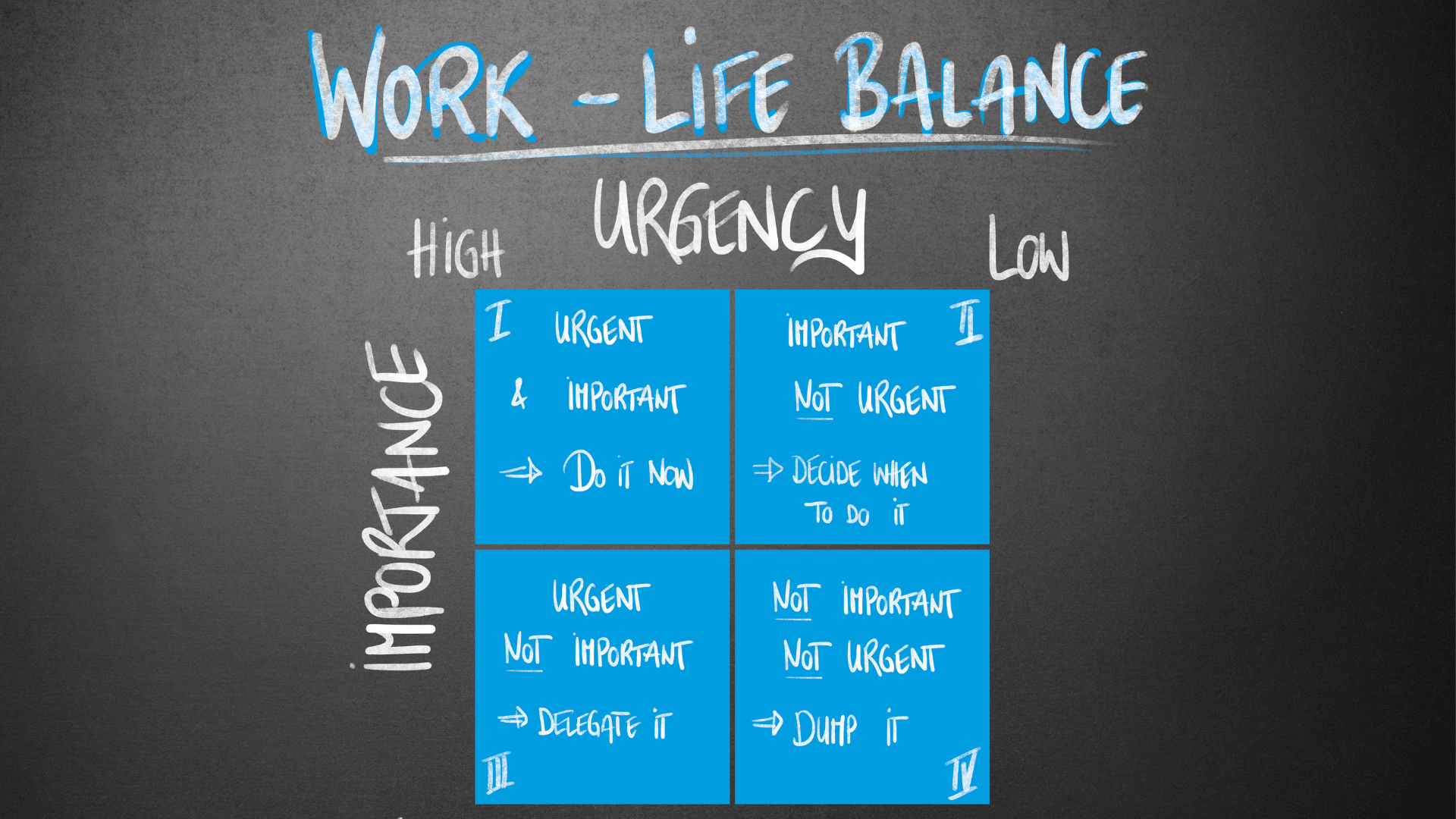Table of Contents
Achieving Work-Life Balance in the UK
In today’s fast-paced world, juggling our professional and personal lives can be a challenge, particularly in the UK, where the culture of long working hours prevails. Even the most diligent CEOs and business leaders can have trouble focusing on one thing at a time, so how can we balance our personal and professional lives without compromising our health? The key lies in mastering the art of time management. By honing your time management skills, you will not only increase your productivity but also achieve a more balanced and fulfilling life.

The Core Principles of Time Management
Before diving into specific techniques, let’s take a look at the fundamental principles behind effective time management:
Prioritisation: Follow these techniques to successfully identify and focus on your most important tasks:
- Make a comprehensive list of tasks: Begin by making a daily to-do list of all the tasks that require your attention in both your professional and personal life. This will provide you with a clear overview of everything you need to accomplish with your time frame.
- Determine the value and impact: Evaluate each task based on its importance, relevance, and potential impact on your goals. Take into account the consequences of not completing a task, or the benefits of completing when determining its value.
- Assign urgency: Assess the urgency of each task by taking into account deadlines, time sensitivity, and any potential consequences of delays. Tasks that are time-sensitive or have approaching deadlines should be given higher priority.
- Rank your tasks: Based on their value and importance, ranking your list of tasks in order of priority, will help you visualise which tasks are most important and should be tackled first.
- Break down larger tasks: For more complex or time-consuming tasks, break them down into smaller, manageable sub-tasks. This can help you avoid feeling overwhelmed and will make it easier to focus on specific aspects of the larger task.
By mastering the art of prioritisation, you can ensure that you’re always focusing on the most important tasks first, making the most of your time and energy, and ultimately achieving a more balanced and fulfilling life.
Organisation: Effective organisation is crucial for successful time management for business owners. Benefits of time management include allowing you to streamline your workflow, managing your tasks more efficiently, and reducing unnecessary stress. By putting in place a well-structured organisational system, you can work more productively, make better use of your time, and ultimately achieve your goals more effectively within a certain time frame.
Follow these steps to create an effective work planning system:
- Choose a task management tool: Whether it’s a physical planner, a digital calendar, or a task management app, select a time management tool or platform that best suits your needs and preferences. The ideal tool should be user-friendly, accessible, and easy to update.
- Consolidate your tasks: Gather all of your tasks from various sources (such as emails, sticky notes, and meeting notes) and input them into your chosen task management tool. This will help you keep track of all your tasks in one central location.
- Categorise your tasks: Organise your tasks into categories based on their type, such as work, personal, or family-related tasks. This will help you quickly identify and group similar tasks together, making it easier to plan and allocate time accordingly.
- Schedule your tasks: Assign each task a specific time and date, taking into account their importance, urgency, and any deadlines. Be honest with yourself about how long it will take to complete each task, and try to avoid overloading your schedule.
- Set reminders and notifications: Use reminders and notifications to help you stay on track with your tasks and avoid missing any deadlines. This can be particularly helpful for time-sensitive tasks or those with specific due dates.
- Review and update regularly: Regularly review and update your task management system to ensure it remains accurate and up-to-date. This will help you stay on top of your tasks, adapt to any changes, and maintain a high level of organisation.
To further enhance your task organisation skills, consider the following tips:
- Break tasks into smaller steps: Tasks that are complex or time-consuming, should be broken down into smaller, easier to manage segments. This can make it easier to schedule and complete each component of the larger task.
- Use colour-coding: Assign different colours to certain task categories or priorities, making it easier to visually manage and identify your work.
- Allocate time for contingencies: Include some extra time in your schedule to account for unexpected tasks or interruptions that may arise.
- Schedule regular breaks: Incorporate regular breaks into your work day to maintain focus and prevent burnout. One such technique that promotes regular breaks to maintain focus is the Pomodoro Technique (discussed in more depth below). Breaks can also provide an opportunity to review your progress and if necessary make any adjustments to your plan.
Focus: In a world that is becoming increasingly connected and fast-paced, maintaining focus on the task at hand is more challenging than ever. However, the ability to concentrate is crucial for efficient time management and productivity. By eliminating distractions and honing your focus, you can complete tasks more effectively, improve your overall efficiency, and reduce the likelihood of errors.
To improve your focus and eliminate distractions, try to follow these steps:
- Create a dedicated workspace: Create a designated space that is solely used for work or task completion, free from distractions and clutter. This space should be comfortable and equipped with all the necessary resources, ensuring that you can work efficiently and without interruption.
- Set specific goals: Clearly define your goals for each task or work session, and establish a deadline for completion. Having specific goals helps maintain focus by giving you a clear sense of direction and purpose.
- Prioritise tasks: Use effective prioritisation techniques to determine the order in which you should complete tasks. By focusing on high-priority tasks first, you can more efficiently manage your mental energy and attention.
- Use time-blocking: Time blocking is a time management strategy that specifically advocates for allocating chunks of time to dedicated tasks in order to promote deeper focus and productivity. Schedule particular blocks of time for specific activities or tasks, and make a commitment to focusing solely on the task at hand during those times. Time-blocking can help minimise distractions or interruptions and will create a sense of urgency that promotes concentration.
- Manage digital distractions: Limit the potential for digital distractions by closing unnecessary browser tabs, disable notifications, and use apps or tools that are designed to block or restrict access to distracting websites and apps. To further improve your focus and reduce distractions, consider the following tips:
- Practise mindfulness: Deep breathing exercises, meditation and other mindfulness techniques can help improve concentration and reduce stress. Regular mindfulness practice can train your brain to maintain focus more effectively.
- Use background noise or music: Some individuals find that background noise or music can help maintain focus by drowning out potential distractions. Experiment with different types of music or ambient sounds to find what works best for you.
- Limit multitasking: Multitasking can lead to reduced focus and increased errors. Instead, focus on one task at a time, giving it your full attention before moving on to the next task.
- Establish a routine: Create a daily routine that incorporates set work periods, breaks, and personal time. A consistent routine can help train your mind to focus during specific periods and improve overall productivity.
Delegation: Delegation is a crucial skill in time management and leadership, as it enables you to allocate tasks to others, so that you can free up your own time for more important duties. Effective delegation as a business owner not only increases productivity but also allows for better utilisation of resources, promotes teamwork, and encourages growth and development within your team.
To delegate your daily to-do list of tasks successfully, follow these steps:
- Identify tasks for delegation: Analyse your daily to do list and determine which tasks can be assigned to others. Consider delegating tasks that are time consuming, repetitive, or can be performed by someone else with the required skills or expertise.
- Choose the right person: Choose a team member who possesses the necessary skills, knowledge, and abilities to complete the delegated task. When making your decision, consider their workload, strengths, and areas for development.
- Communicate clearly: When delegating a task, provide clear and concise instructions, outlining the objectives, expectations, and deadlines. Make sure the individual understands the task and has all the necessary information and resources to complete it.
- Establish accountability: Assign responsibility for the delegated task and set clear expectations for the desired outcome. This will help ensure that the individual takes ownership of the task and is accountable for its completion.
- Provide support and guidance: Offer assistance and guidance as needed, but refrain from micromanaging. Encourage the person to ask questions or seek clarification if they encounter any difficulties.
- Monitor progress and provide feedback: Check in with the individual frequently to review their progress and provide constructive feedback. This will help ensure the task is on track and allows you to address any issues or concerns that may arise. To further enhance your delegation skills, consider the following tips:
- Delegate with trust: Trust in the abilities of the person to whom you are delegating the task. While it’s essential to monitor progress, avoid micromanaging, as this can undermine trust and hinder growth.Be open to different approaches: Recognise that the person you’ve delegated the task to may approach it in a different way than you would. Be open to alternative methods, as long as they achieve the desired outcome.
- Encourage growth and development: Use delegation as an opportunity to help your team members develop new skills, enhance their existing abilities, and grow professionally.
- Recognise and reward: Acknowledge the efforts and achievements of your team members in completing assigned tasks. Offer encouragement and acknowledgement, as this can motivate them and reinforce their confidence in their abilities.
Flexibility: Effective time management requires flexibility, as it allows you to adapt to unexpected changes and make adjustments to your plans and strategies when needed. Embracing flexibility enables you to maintain productivity and make better use of your time, even in the face of unforeseen obstacles or shifting priorities. To improve your flexibility and adapt your plans and strategies to changing circumstances, follow these steps:
- Embrace a growth mindset: Adopt a mindset that sees change as an opportunity for growth and learning, rather than as a threat. This mindset will help you remain open to new ideas, experiences, and challenges, allowing you to adapt more effectively.
- Develop contingency plans: Anticipate potential obstacles or changes and prepare backup strategies to address them. This will enable you to maintain productivity and remain on track even when faced with unforeseen challenges.
- Prioritise and re-evaluate: Regularly review and reassess your priorities, adjusting them as needed to accommodate changes in circumstances or goals. By keeping your priorities up-to-date, you can ensure that your time and energy are always focused on the most important tasks.
- Be open to feedback: Listen to feedback from others, and be willing to incorporate their suggestions or insights into your plans and strategies. Feedback can help you identify areas for improvement and make necessary adjustments.
- Stay informed: Keep yourself updated on any changes or developments that may impact your tasks or goals. Staying informed enables you to make well-informed decisions and adapt your plans and strategies accordingly.
To further improve your flexibility, consider the following tips:
- Set realistic expectations: Recognise that plans and strategies may need to change, and be prepared to make adjustments when needed. Setting realistic expectations can help you remain flexible and adapt more easily to change.
- Practise adaptability: Regularly expose yourself to new experiences, challenges, and situations that require you to adapt and think on your feet. This will help you develop your adaptability skills and become more comfortable with change.
- Learn from setbacks: When faced with obstacles or setbacks, view them as learning opportunities and use the experience to influence your future plans and strategies.
- Cultivate resilience: Develop resilience by maintaining a positive attitude, focusing on your strengths, and developing effective coping strategies to deal with change and adversity.
Time Management Techniques for Work-Life Balance in the UK
Now that we’ve established the fundamentals, let’s explore some practical techniques that can as a business owner help you balance your professional and personal life with time management brilliance.
The Eisenhower Matrix
The Eisenhower Matrix, was a technique used by the former US President, it is a simple yet powerful tool that allows you to prioritise your tasks based on their urgency and importance. By categorising your tasks into one of four quadrants – urgent and important, important but not urgent, urgent but not important, and neither urgent nor important – you’ll have a clearer idea of which tasks to tackle first and which can wait.
The Pomodoro Technique
Another time management technique is the Pomodoro Technique, originating from Italy. It involves breaking your work into short, focused intervals (usually 25 minutes) called “Pomodoro’s,” followed by a short break. This method can help you maintain focus, reduce burnout, and increase productivity. After completing four Pomodoro’s, take a longer break to recharge your mental batteries.
The 80/20 Rule (Pareto Principle)
The Pareto Principle, also known as the 80/20 rule, suggests that 80% of your results come from 20% of your efforts. Identify the tasks that reap the highest returns and prioritise them. By focusing on these high-impact activities, you can optimise your time management and achieve more significant results.
Embracing Work-Life Balance in the UK
Remember, achieving a work-life balance isn’t about working harder – it’s about working smarter. By incorporating these time management techniques into your daily routine, you will find yourself enjoying greater productivity and a more harmonious balance between your professional and personal goals, giving positive impact all round. Start putting these tactics into practice right away and experience the benefits of time-savvy success, even in the bustling environment of the UK.















